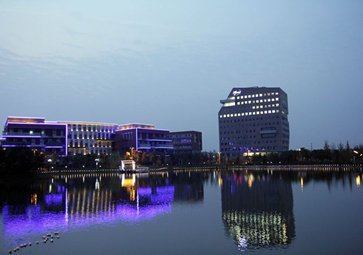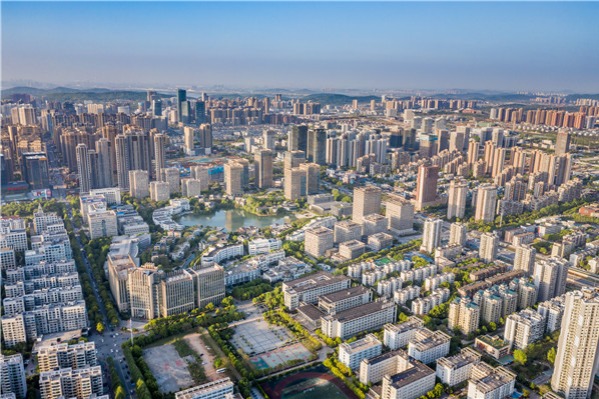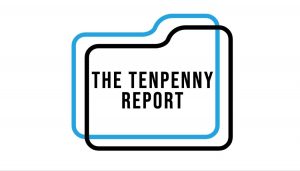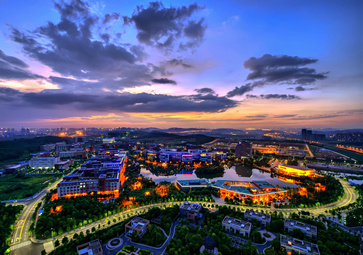Ahh, Biolake. Sounds peaceful, right? Maybe there’s even a cozy cabin where you can watch a nice sunset. Actually, Biolake does have a shimmering lake surrounded by trees, but it is not in Yellowstone or California or even the United States. Biolake is in Wuhan, China, and is better known as the National Bioindustry base. The Chinese government wanted to attract Fortune 500 companies to the newly established area, and they did. The first company to join the fledgling Biolake? Pfizer, in 2010.
The site head of Pfizer in Wuhan said Biolake was absolutely barren in 2010. It was just a figment of the CCP imagination. Pfizer started out with fewer than 10 people but by 2016, employed 500 people. Pfizer invested large sums of money into their new location and now they have an office complex with lots of rich detail, such as the carpet pattern inspired by pharmaceutical tablets.

The Pfizer complex in Wuhan’s Biolake.
The Wuhan location quickly became a core part of Pfizer research and development (R&D), quickly evolving to perform many key functions in Pfizer’s R&D pipeline. In fact, some R&D is only performed in Wuhan, and nowhere else in the world. For example, and quite interestingly, the Wuhan team manages the clinical trial master files and the clinical trial registries for all of Pfizer. The Wuhan team makes “indispensable contributions” to nearly every new Pfizer drug.
This is an actual quote from a 2016 article regarding their clinical trial management: “No other but our Wuhan teams manage the clinical trial registry information and clinical trial master files for all Pfizer’s medicines. These are of utmost importance – making any mistake or losing documents could mean the medicine would never go to market.”
Given Pfizer’s abysmal record of COVID-19 clinical trials (rather lack thereof) and hiding of documents showing adverse events, this statement is truly astounding.
Pretty soon, eight more Fortune 500 Big Pharma companies had a presence at Biolake, attracted by Pfizer’s great success. Sanofi Pasteur is there and seems to have copied the Pfizer Wuhan model. In 2018, Sanofi launched its global R&D operations there, and just like Pfizer, made Wuhan its global multi-center for clinical trials data and files.
The map below represented Sanofi’s Chinese presence in 2018, with 11 facilities and nearly 10,000 employees. Sanofi and the China National Pharmaceutical Group co-created the Biolake International Vaccine Park to offer “innovative technology and high-quality biological products” worldwide.

Joining Sanofi and Pfizer are Bayer, Fresenius Kabi, Thermo Fisher, Honeywell and DuPont Pioneer.
This is a good time to remind readers that the official narrative is still that the coronavirus came from a bowl of bat soup in a wet market, remember?
Biolake Today
Biolake was originally envisioned as a 100-billion-yuan industry for China, and in practice has far exceeded that concept. Today, Biolake, also known as Optics Valley or OVC, is China’s second largest biotech industrial base, with over 3,000 companies located there. That’s staggering. The modest beginnings have blossomed into a super city with seven industrial parks focused on a biomed industrial cluster that includes ‘smart’ and precision medicine, engineering, and agriculture.
Biolake is one of China’s key medicine research centers with an innovative medicine incubator. It also houses the national genetic engineering platform, is the largest incubator for manufactured medical equipment, and houses China’s national reproductive health industrial base.
Companies pull employees from the many quality universities in the Hubei province. These centers have developed 30 Class I new drugs, nearly 60 veterinary drugs and over 500 new Class 1 and 2 medical devices. To round out their portfolio, Biolake companies have also developed nearly 70 new crop varieties.
This summer, Biolake raised over $1 billion from nine companies to make things like organoids and organs on a chip, synthetic biology and of course more drugs. An organoid is a miniaturized version of an actual organ (like a liver); it is produced in vitro and mimics the biological complexity and functionality of the actual organ. The same is true for organ-on-a-chip, whereby the function of an organ is reproduced on a computer chip.
They also signed an agreement with Shanghai Pudong Development Bank for the bank to provide “comprehensive financial services.” Is this bank private or state-owned? You already know the answer.
They do it all, it seems.
Wow, what a difference a few years – and a plandemic – make.
Of course, Biolake (and Pfizer) had major boosts from the Chinese government’s support. It’s attractive, and as far back as 2016, many US “friends” were starting businesses or relocating to Wuhan. And of course, Pfizer attributes its success to the significant government support in Wuhan.
Putting The Pieces Together
It is really not that difficult to put the pieces of this puzzle together. First, we know that China has worked for years on its highly ambitious ‘Made in China 2025 initiative’, aimed at global tech leadership in all areas such as AI and yes, in biotech. In fact, China’s goal is to become the global tech power in ten core industries by 2049. The mainstream media tells us that foreign companies view China as a rival and not a partner, but that is hard to believe given that Biolake not only exists but is massively flourishing.
Second, we all know that nearly all Chinese industry is state-owned, like this Fortune article tells us. It is literally titled China’s Global 500 companies are bigger than ever—and mostly state-owned.” Experts like these MERICS authors say the Biolake initiative is a way for China to optimize its state-capitalist system.
Third, the US has had a steadily growing dependence on China for most of our medications. In Congressional testimony during the Trump administration, Americans found out that 97 percent of all antibiotics in the United States came from China. This is such a big problem that it creates a national security risk. Centralization of the global supply chain of medicine to a single country makes that supply chain extremely vulnerable to interruption, whether that is by mistake or design. Just look at the recent early October 2024 port strike, which was resolved quickly – this time.
Yet despite these three glaringly obvious facts staring us straight in the face, we are supposed to believe that Biolake poses no threat to America. Pfizer and other pharma companies are just doing global business, they say. We know China will stop at nothing to become the global tech superpower. We witness our own government infiltrated on every level and our current administration at the CCP’s beck and call. We are increasingly dependent on China for many things, especially medicine. We witnessed Pfizer (and others) egregious money grab (at best) and genocide (at worst) with the COVID jabs.
But we’re supposed to believe our government and these companies are just business as usual. Still today, you can be fact-checked by the powers that be about Wuhan, COVID-19…all of it. Here is one example of Reuters telling us that Wuhan Institute of Virology (WIV) is not owned by Glaxo. Maybe, maybe not, but is there really a line of delineation there to determine who owns what? On paper, Glaxo does not own WIV, but now that you’ve learned about Biolake in this article, does it really matter? They’ve all been working together to our detriment for decades.
++++++++++++++++++++++++++++++++++++++++++++++++++++++++++++++++++
 Like what you’re reading on The Tenpenny Report?
Like what you’re reading on The Tenpenny Report?
Share this article with your friends. Help us grow.
Get more of Dr. Tenpenny’s voice of reason at her website.
Join our list here
Make a donation here (and thank you!)
++++++++++++++++++++++++++++++++++++++++++++++++++++++++++++++++++
Fed Up Texas Chick is a contributing writer for The Tenpenny Report. She’s a rocket scientist turned writer, having worked in the space program for many years. She is a seasoned medical writer and researcher who is fighting for medical freedom for all of us through her work.

